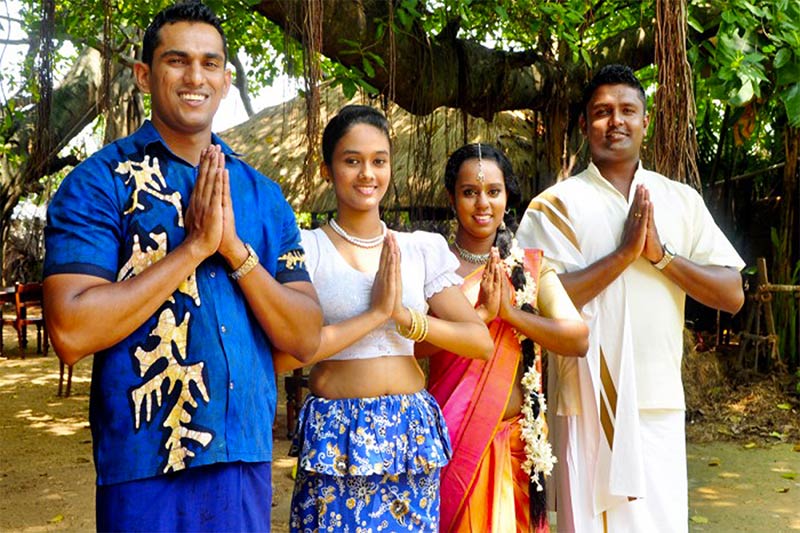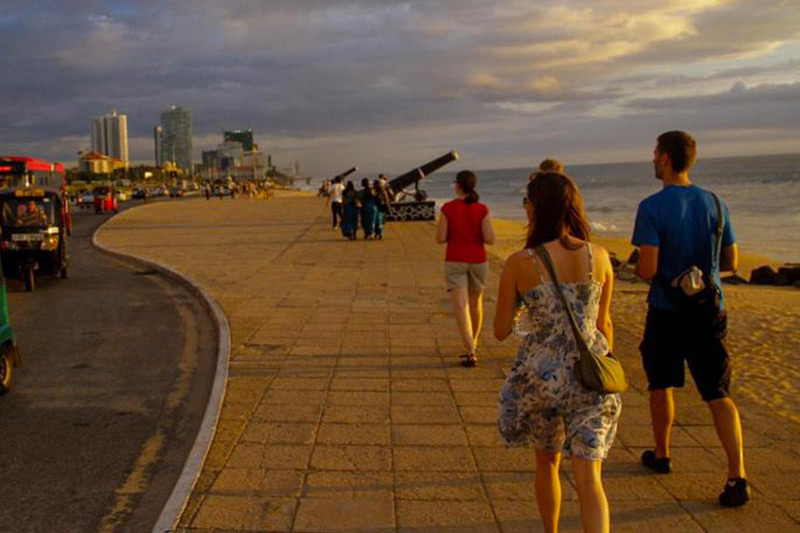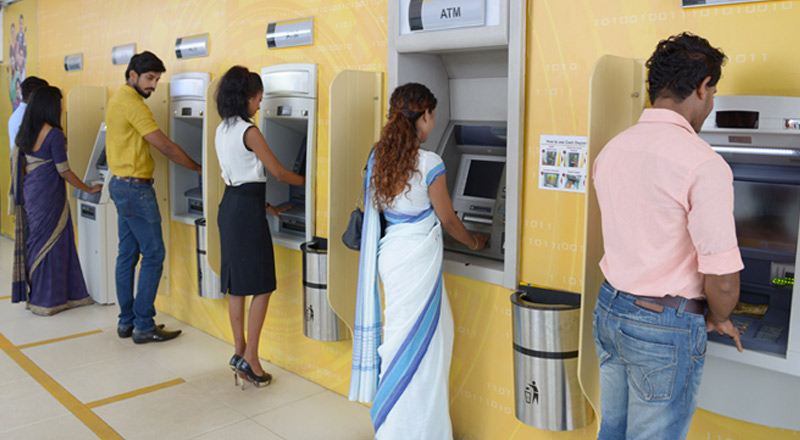Sri Lanka is the beauty queen of the Indian Ocean. With sloping hills, lush jungle and golden shores, it’s hard not fall in love with this paradise island. Yet, all this natural splendour would be in vain if the country wasn’t safe enough to visit.
One of the most common questions people have when choosing a holiday destination is “how safe is it”? And why wouldn’t it be? No matter how beautiful a country is, we won’t go there if it is unsafe. Fortunately, Sri Lanka does not raise too many concerns in this department. Need a bit more convincing? Allow us to break down everything that makes this country safe and highlight the things you should look out for.
The short answer to this is yes. Sri Lanka is a safe holiday destination. Over 2 million tourists travelled to Sri Lanka in 2016 – a 14% increase from 2015. Nowhere gets that many tourists if it is considered unsafe. However, there are a few things you need to watch out for…
The crime rate in Sri Lanka is low – particularly crime affecting tourists. Petty theft and scams are the most common crimes that travellers encounter. Fortunately, this is almost never violent and can be avoided by having your wits about you. Corruption has been an issue in Sri Lanka in the past but this is unlikely to affect your holiday.

Sri Lankans are truly very friendly and helpful people who are a million times more likely to help than hurt you. During my month in the country I was greeted 99% of the time with big smiles and a genuine willingness to help.
Despite this, there are a few things to look out for as a tourist – particularly scams. If you do get scammed then try not to hold a grudge. Sri Lanka is a poor country, rebuilding itself from its recent civil war, and so people will do anything for some easy money.
Tourists are often targets for theft in poor countries. Sri Lanka is no exception. Keep your belongings out of plain sight and be aware of your surroundings and you will be fine. You should also be on the look-out for scammers and con-artists.
Often, people in the service industry will give you false information in order to get you to then pay to use their service. For example a taxi driver might tell you there is no bus to where you are going so that you will pay him to drive you. These scams are not violent but could cheat you out of money.
When it comes to general daily life, travellers are very unlikely to feel threatened or unsafe.
As with anywhere in the world, if you are travelling alone then you will need to take extra care to stay safe. As a single traveller you are still unlikely to encounter trouble from the locals. If you are alone then you’re biggest concern should be being careful whilst swimming.
The water surrounding Sri Lanka can get notoriously choppy. It is best to avoid swimming on the west and south coasts between April and December. If you are alone and encounter trouble swimming then your swim could end up being fatal.
Yes, it is safe. I did not have any problems in Sri Lanka as a single female traveller. I spent a month travelling around the country without ever feeling in danger. The only annoying thing I encountered was several different men trying to strike up conversation with me. That’s about the extent of it. I also got asked a lot where my husband was. Annoying but not dangerous.
The majority of the time, the hassles women encounter are catcalling, staring and poor attempts at starting conversations. It is incredibly rare for this to ever turn into anything threatening or violent. Normally a firm ‘no’ will be enough to deter any interest from men.
Women travelling solo should also avoid walking around alone at night. This advices applies to anywhere in the world – not just Sri Lanka. If you find yourself alone at night then choose a taxi or tuk tuk over walking. When picking a taxi, make sure it is just you and driver in the taxi and nobody else that you don’t know.
If you want to avoid drawing too much attention then try and dress conservatively. Covering your arms and legs won’t completely eliminate the possibility of being hassled by men but it will reduce it.
Last year, the World Economic Forum published a report on safety and security around the world. Sri Lanka ranked 59th on the list – above France (67th), Italy (70th) and the UK (78th). Hopefully this will further put your mind at ease about travelling Sri Lanka as a single female.
Until recently, the North was not safe to visit. However, since the end of the civil war in 2009 the North has become more and more popular with tourists. Now, the island is fine to visit everywhere.
If you don’t want to encounter drunk and seedy types then avoid walking through Colombo at night, particularly along Galle Road as this is where the casinos are. You should also avoid the beach at night time as there is a heightened risk of being robbed.
Yes. However, there are some things you will need to watch out for. The main danger for children in Sri Lanka is traffic. The roads can be pretty crazy in Sri Lanka, especially in the cities, so make sure you guide your children across the road.
You should also keep an eye on what your children eat. The food in Sri Lanka can be very spicy and can unsettle anyone’s stomach, let alone that of a child. Make sure you take some medicine with you to help deal with any upset tummies.
Finally, make sure you watch your children on the beach. As mentioned earlier, the sea can get quite rough and there is a very real danger of drowning. Don’t let your kids wander off alone on the beach or go in the water alone – even if they are strong swimmers.

Big cities always come with their share of dangers but luckily Colombo is safe. As with anywhere, you should avoid walking around late at night. This particularly applies to areas with a high density of casinos and nightclubs. You should also make sure you don’t have any valuables on show as this might make you a target.
It is fine to chat to the locals in Colombo but don’t give away too much information.
However, scammers are a real danger here so never tell someone where you are staying or what you plan to do. If you are using taxis, always make sure you agree a price before getting in. If they refuse to do this then don’t use their taxi. If a taxi has a meter in it then make sure the driver uses it.
To be perfectly honest, I don’t recommend spending too much time in Colombo. It is a big, dirty city with lots of traffic and not much else. Sri Lanka has so many breath-takingly beautiful places – don’t waste your time in Colombo.
Most of the big hotels – especially the international chains – will have safety deposit lockers in the room. It is a good idea to leave your valuables here during the day. If you are staying somewhere that seems a bit run-down or seedy then think twice about using the locker.
If your hotel doesn’t have a safety deposit box or it does but you don’t trust it then you can rent one. Sampath Bank rents safety deposit boxes for as little as 5074 RUP (€28.40, £25, $33) for a year (although you won’t need one for that long). This is one of the few places that will rent lockers to tourists.
Of course, with Sri Lanka’s crime rate being particularly low, a safety deposit locker is not essential. If it puts your mind at ease then go ahead and get one but it is far from necessary.

Fairly safe, however read on. Back in 2016, Sri Lanka had some problems with cards being copied at ATMs. There were a number of ATMs found with skimming devices attached to them installed by foreign nationals, not Sri Lankan’s. While this problem seems to have been resolved, it is better to be safe than sorry. Try to use ATMs that are attached to banks to be on the safe side. These ATMs are usually inside and guarded, making them much safer.
I also recommend taking more than one bank card with you (a credit card AND a debit card is a good idea). This means you have a back-up card, just in case one of them gets copied.
You should also be aware that some ATMs will charge you to withdraw money. This does not mean they are untrustworthy. This fee is usually very little for debit cards (between 7-35p) but can be up to 1015 RUP (€5.70, £5, $6.61) is you use a credit card.
As with anywhere in the world, it is safe to carry cash on you in Sri Lanka as long as you keep it out of sight. Men, it is a bad idea to keep your wallet in your back pocket as it is easy to see (and steal) here. It is also a good idea not to keep all your cash in one place. Put some in your bag, some in a hidden pocket, some in your fanny pack etc.
Doing this means that you are less likely to have all of your money stolen as pick pockets will only be able to target one place. As they say “don’t put all your eggs in one basket”. This advice is applies when travelling to any developing countries as they usually have higher rates of pick-pocketing.
During my trip I withdrew enough in Kandy to last me the whole trip and didn’t have any problems.
Yes and No. The most popular beach destinations are on the west and south coasts. These destinations include Mirissa, Hikkaduwa, Unawatuna and Bentota. From December to April it is generally fine to swim in the sea here. However, from April to December the sea can get rough and drowning becomes a real danger.
It is estimated that 3 people die from drowning in Sri Lanka every day.
If you want to swim from April to December you are better off heading to the beaches in the North and East as the sea will be much calmer here.
Generally speaking, tuk-tuks are safe to use. I never had any problems using them while I was in Sri Lanka. However, you should take note of the following…
Driving in Sri Lanka is always a slightly dangerous endeavour, especially if you’re in a tuk-tuk. With congested roads and all manner of vehicles vying for space, smaller vehicles tend to be in more danger. Tuk-tuks fall into this category unfortunately.
The rule tends to be that the biggest vehicle is king of the road, even if they are driving on the wrong side. This means that mopeds and tuk-tuks will just have to get out of the way, even if it is their right of way.
Sri Lanka also has a bit of a drink-driving problem and tuk-tuk drivers are usually the worst culprits. If you are going to take a tuk-tuk, have a word with the driver first and make sure he is sober.
As I’ve mentioned, when you drive in Sri Lanka you take your life in your hands. On paper, it is safe to hire a car in Sri Lanka but there is not much point in my opinion. Hiring a driver, who will understand the roads and rules far better than you, can cost as little as £40 a day. The majority of travellers opt for this as it is safer, easier and not much different in price.
Hiring a driver allows you the freedom to go wherever you want without the stress of actually driving. If this is what you want then we can organise a driver for your trip. Quite often your driver will double up as a tour guide as well.
If you do decide to hire a car then make sure you go with a reliable company. Lonely Planet recommends using Shineway. You are also supposed to have a temporary Sri Lankan license, which can be obtained from the Department of Motor Traffic or Sri Lanka Automobile Association. Shineway will help you acquire this and provide you with comprehensive insurance.
Another thing to take note of is the fact that a lot of rental companies will give you their lower end vehicles. Naturally, they don’t want someone with no Sri Lankan driving experience taking out their best cars. This being the case, you are likely to break down or have some kind of problem with your car.
Don’t forget that they drive on the left here so you might need to adjust, depending on where you are from.
Be aware that road conditions are not always particularly good in Sri Lanka. This means getting a puncture is pretty likely. There are repair shops in all the towns (they know how bad the roads are) but be prepared to spend some of your holiday time getting your tyre fixed.
With road signage being truly minimal, asking directions can also be a challenge, especially if you don’t speak Sinhalese. Sri Lankans always want to help you and would rather give you an answer than say they don’t know. Unfortunately, they will give you an answer even if they don’t know. This could mean wasting time and mileage following false directions.
My final point would be that road accidents are very common in Sri Lanka. Even if you are driving safely and sensibly, you can’t account for those around you. Accidents mean police reports for insurance purposes and this can take a really long time. Think hard about whether you want to potentially waste your precious holiday time in a police station.
For over 25 years, Sri Lanka was considered one of the most dangerous countries in the world. However, since the war ended in 2009 the country has completely changed. Now, the country relies heavily on tourism to fund the rebuilding of its northern, war-torn towns.
Now, the situation is steady. The Tamil Tigers have been defeated and analysts have concluded that there is no chance of a resurgence.
The only issue Sri Lanka now faces is making enough room for all the tourists that are flocking there. There is still a noticeable lack of trained workers and accommodations but this is slowly being resolved.
The primary danger for tourists exists on the roads. Collisions, accidents and drunk-driving are daily occurrences making Sri Lankan roads uncommonly lethal. Fortunately, these problems are generally limited to the big cities. You won’t have these problems in the highlands for example.
Second to this is scams. Tourists always have more money than locals – even backpackers do. This makes them prime targets for scam artists. The best way to avoid being ripped off is to keep your wits about you. Don’t give out information about yourself and be wary of anyone who seems too friendly.
Take a look at this list for an idea of what the most common scams are and how to avoid them.
The good news is that there haven’t been any deaths reported from malaria since 2008. With that out the way, travellers can focus on the other diseases at hand – such as Dengue Fever.
Dengue is caused by mosquitos and is particularly prevalent in and around Colombo.
Unfortunately, there is no vaccine for Dengue so prevention is your only option. Wear plenty of bug repellent (containing at least 50% DEET) and cover your arms and legs as much as possible to avoid being bitten.
You should also make sure you are vaccinated against Hepatitis A, Typhoid and Hepatitis B. Additionally, check that you are up to date with all the vaccines required for living in the UK (or wherever you call home).
There is no way to guarantee a perfectly safe trip to Sri Lanka but you can do a lot to avoid danger. Here is a brief summary of everything you can do to make your trip as safe as possible:
It might seem like a lot to take in but if you follow these guidelines you are sure to have the holiday of a lifetime.